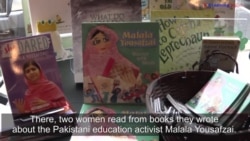Malala Yousafzai is known for promoting education as a basic right, especially education for women and children.
The 21-year-old Pakistani activist became world famous after she was shot in the head by a Taliban militant.
At the time, the Taliban was fighting for control of her hometown in northwest Pakistan. She was attacked for expressing support for the education of girls.
Malala Yousafzai has won awards for her human rights work. In 2014, at the age of 17, she was the youngest person to win the Nobel Peace Prize. She shared the 2014 peace prize with a child rights campaigner from India.
Yousafzai has written books and many books have been written about her.
A bookstore in Vienna, Virginia, had a special event on a Saturday morning last month. It asked two women who have books about Yousafzai to come and read from their works.
Young children, their parents and grandparents came to hear the two authors.
“Malala was recovering from a serious injury. It was a miracle she could stand up at all. But she stood up in front of the whole world to prove that words have power.”
That was Karen Leggett Abouraya reading from her book, ‘Malala Yousafzai: Warrior with Words.’ The crowd also heard from Jenni L. Walsh, author of the book, ‘She Dared – Malala Yousafzai.’
“Malala was a very good speaker, much like her father. People listened to him and it seemed like people wanted to listen to Malala, too. Her first speech was publicized across Pakistan with the title, ‘How dare the Taliban take away my basic right to education.’
In the year 2007, the influence of the Taliban was growing in Pakistan’s Swat Valley. Malala Yousafzai’s father owned a school and supported her writing about life under the Taliban for a British website. Pakistani forces and the Taliban fought for control of the Swat Valley. Schools for girls were closed. Malala continued to write and speak publicly about the importance of education for all children, especially girls.
Her life changed forever in 2012, when she was 15 years old. On a ride home from school, a Taliban gunman got on her bus. He shot Malala and two of her friends. They survived, but Malala’s wounds were severe. She was taken to a hospital in Birmingham, England, where wounded soldiers were treated. There, she recovered with no lasting injury to her brain.
Less than a year later, when she turned 16, Malala was at the United Nations in New York, speaking out for education.
Karen Leggett Abouraya says the speech was a turning point.
“And there she is in front of the United Nations. It was a group of young people, she was speaking on her birthday. ‘We will bring change through our voice,’ she said. She asked every nation to make it possible for all children to go to school and live in peace. ‘Our words can change the world.’
Author Jenni L. Walsh continues the story.
“Malala wondered out loud: ‘How can they stop more than 50,000 girls from going to school in the 21st century?’”
Today, Malala Yousafzai is studying philosophy, politics and economics at the University of Oxford. And, she says she fights every day so that all girls receive 12 years of free, safe and quality education.
I’m Dorothy Gundy.
Dorothy Gundy reported on this story and produced the video for VOA Learning English. George Grow was the editor.
We want to hear from you. Write to us in the Comments Section.
_____________________________________________________________
Words in This Story
promoting – v. helping (something) to happen, develop, or increase
miracle – n. an unusual or wonderful event that is believed to be caused by the power of God






